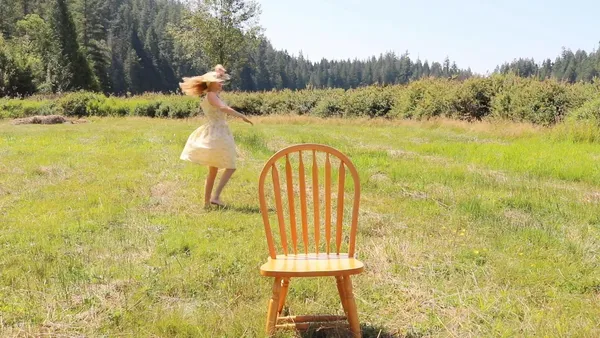 |
| Honeycomb |
The story of five young women – later to be joined by a sixth – who acquire a remote house in the countryside and decide to live there for the summer, by their own rules, Honeycomb is among the outsider contributions at 2022’s Fantasia International Film Festival. It was made on a budget of just $3,000, including “a little bit of money for beer and to buy some food for people sometimes,” as the director puts it. There’s a note in the credits thanking BC Ferries for failing to realise that cast and crew were no longer students when they were commuting to and from the Cortes Island set. When Avalon and I met up on the second day of the festival, we discussed the way that privation bred creativity at every stage, even down to the delightful use of plasticine animation in the opening credits.
“Yeah,” she laughs. “I had been debating on how to do an interesting credits scene from the beginning, and I really like stop motion. I just thought ‘I'm going to try to do this myself.’ I actually had each one of my roommates make up the little bees, and that worked well, because they were the cast of Honeycomb as well.”
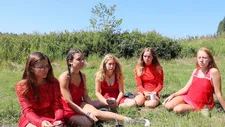 |
| Honeycomb |
There is also a painting in the film, which is found in the house and becomes the centrepiece in a makeshift shrine.
“It was done by a friend of ours,” she explains. “It was a time crunch. We were about to shoot that shot, I had this idea of that image in my head, and I basically just explained it to our friend a week before we were going to shoot and they managed to pull that together. It’s beautiful. It sits in my living room now, and it's funny because I live with the queen bee so we just have her picture up on the wall.”
As a filmmaker, she is very clear about her priorities.
“It’s important, for me, having women be the focus. I wanted to make a film where women play the lead.
“I wrote this story the year that I graduated high school and moved away to a different city than where most of my friends were. I think, coming to terms with it now and understanding what I was going through back then, writing Honeycomb was a way for me to come back together with my old group of friends and reconnect with my girlfriends. And also, in a way, that's what the story's about. You know, it's about saving time and not losing that closeness. With all the free time that summer has, they're making sure they're staying together.”
Their activities in the house attract speculation from the boys who were previously a part of their lives and now provide a sort of Greek chorus for the film, one step removed from the action.
“ That came from within my own life,” she says. “My girlfriends and I will have our girl times where it'll just be us, and it becomes some type of an exclusive thing. I know that our other, guy friends have wondered like, what are they doing at girls night? Like, what's going on at girls night? Why can't we be there? I think the boys or men can feel kind of excluded from that space.”
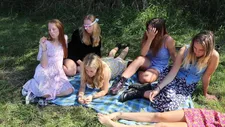 |
| Honeycomb |
Despite the theme, however, this isn’t a story about a group of girls who all orbit one person.
“I didn't want you to be able to pick out right away who was the queen,” she explains. “And to not necessarily have to guess. How I think it works in the actual world is, the queen isn't necessarily the one making the decisions. It's just a role that they play. Like, that's just what they become. So that was important for me, I didn't want the queen bee to necessarily be the leader or the one making decisions.
“My closest friends are great actors, so that worked. But I wrote those roles for them, for each one of their personalities. To me is who they are, amplified and exaggerated.”
The number of ensemble scenes presented challenges.
“In a sense, we had the whole summer to shoot in, but everybody involved was also working big jobs so you know, in total, I think we might have gotten eight days when we were all properly able to shoot together, and it was hard because there's so many scenes where all five women need to be in shot, but somehow we made it.
“Some of the cast and crew, including myself, at the time were actually living on Cortes Island,” she says. “My family had a family home over there so it was somewhere where I would spend summers when I was going to high school and stuff. It was definitely like a good hangout spot for all of us. That place has a lot of nostalgia for me. I knew it well. It was just making sure that there weren't already other groups of kids hanging out there.” She laughs.
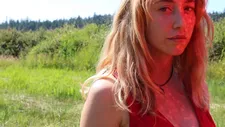 |
| Honeycomb |
There are some complex composite scenes in the film. How much did they change from script to shoot to edit?
“It was pretty close to the script. There were a couple of times when we we were getting close to the end there where I had to modify some things. I remember changing the scenes a bit when locations weren't going to work. It was a very rainy summer as well, so we had to go indoors and change things around a bit. And then I did a lot of work with that footage, and ended up in a bit of a different order than maybe it was originally.”
I note that there’s an increasing tendency now to see filmmakers using impressionistic techniques rather than traditional linear storytelling, and Honeycomb seems to fit that pattern.
“Yeah, I've always loved that. I mean, for me, a movie is not something that has to make sense. There were so many times when we'd be like, ‘Oh, well, that could happen. It's a movie, it doesn't have to be so realistic.’ Those are the kind of movies I take inspiration from. So yeah, I definitely I remember writing in those inserts and different things going on that don't necessarily connect to the story exactly in order. I did write those in the script.”
It seems to me that there’s a balance between her natural and fresh shooting style and the often quite formal dialogue.
“Yeah. You know, with the boys, it was really fun. And I was okay with it, they would take their lines and then just run with it, and that's what I wanted, I wanted it to seem very natural and friendly. But when it came to when the girls spoke, it was it was supposed to be very rigid. It was supposed to be theatrical, almost feeling like a little bit rigid. In my mind that that was what I was going for there.”
It seems to mirror the rigidity of the rules the girls make, which inevitably lead to trouble.
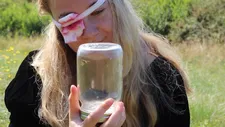 |
| Honeycomb |
“I’ve found that when girls, or people in general, get exhausted, and when they, when they get in those tight spaces with the same people and they're not hearing outside opinions, it can take it to another place really quickly,” she says. “They develop these ideas and these opinions that become very strong, and there's nobody to tell them otherwise. So that was my thought. And these girls were just making up these ideas about life and about the rules and how they should be living, just with themselves, without listening to anybody else. They had nobody to tell them otherwise. And so yeah, it goes a little bit too far.”
Then there’s coming of age element to it as well.
“Yeah. That time when you are first out of school, and you have all that free time, and you're like, ‘Oh, I'm a person now. This is super scary!’ And that's what I was going through. I think that's what happened very naturally, for me, at the time writing it. For me, it was just my life.”
Given these humble beginnings, she’s thrilled by the film making it to the festival, saying “Fantasia was very unexpected and It has been the festival I was most looking forward to,” and it’s all the more exciting for her because her new project, Camp – “a feature film screenplay about an evil summer camp” - is a part of the Frontières market, so there is hope for more good things to come.





















